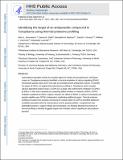Identifying the target of an antiparasitic compound in Toxoplasma using thermal proteome profiling
Author(s)
Herneisen, Alice L; Sidik, Saima M; Markus, Benedikt M; Drewry, David H; Zuercher, William J; Lourido, Sebastian; ... Show more Show less
DownloadAccepted version (959.1Kb)
Open Access Policy
Open Access Policy
Creative Commons Attribution-Noncommercial-Share Alike
Terms of use
Metadata
Show full item recordAbstract
Copyright © 2020 American Chemical Society. Apicomplexan parasites include the causative agents of malaria and toxoplasmosis. Cell-based screens in Toxoplasma previously identified a chemical modulator of calcium signaling (ENH1) that blocked parasite egress from host cells and exhibited potent antiparasitic activity. To identify the targets of ENH1, we adapted thermal proteome profiling to Toxoplasma, which revealed calcium-dependent protein kinase 1 (CDPK1) as a target. We confirmed the inhibition of CDPK1 by ENH1 in vitro and in parasites by comparing alleles sensitive or resistant to ENH1. CDPK1 inhibition explained the block in egress; however, the effects of ENH1 on calcium homeostasis and parasite viability were CDPK1-independent, implicating additional targets. Thermal proteome profiling of lysates from parasites expressing the resistant allele of CDPK1 identified additional candidates associated with the mitochondria and the parasite pellicle-compartments that potentially function in calcium release and homeostasis. Our findings illustrate the promise of thermal profiling to identify druggable targets that modulate calcium signaling in apicomplexan parasites.
Date issued
2020Department
Massachusetts Institute of Technology. Department of BiologyJournal
ACS Chemical Biology
Publisher
American Chemical Society (ACS)